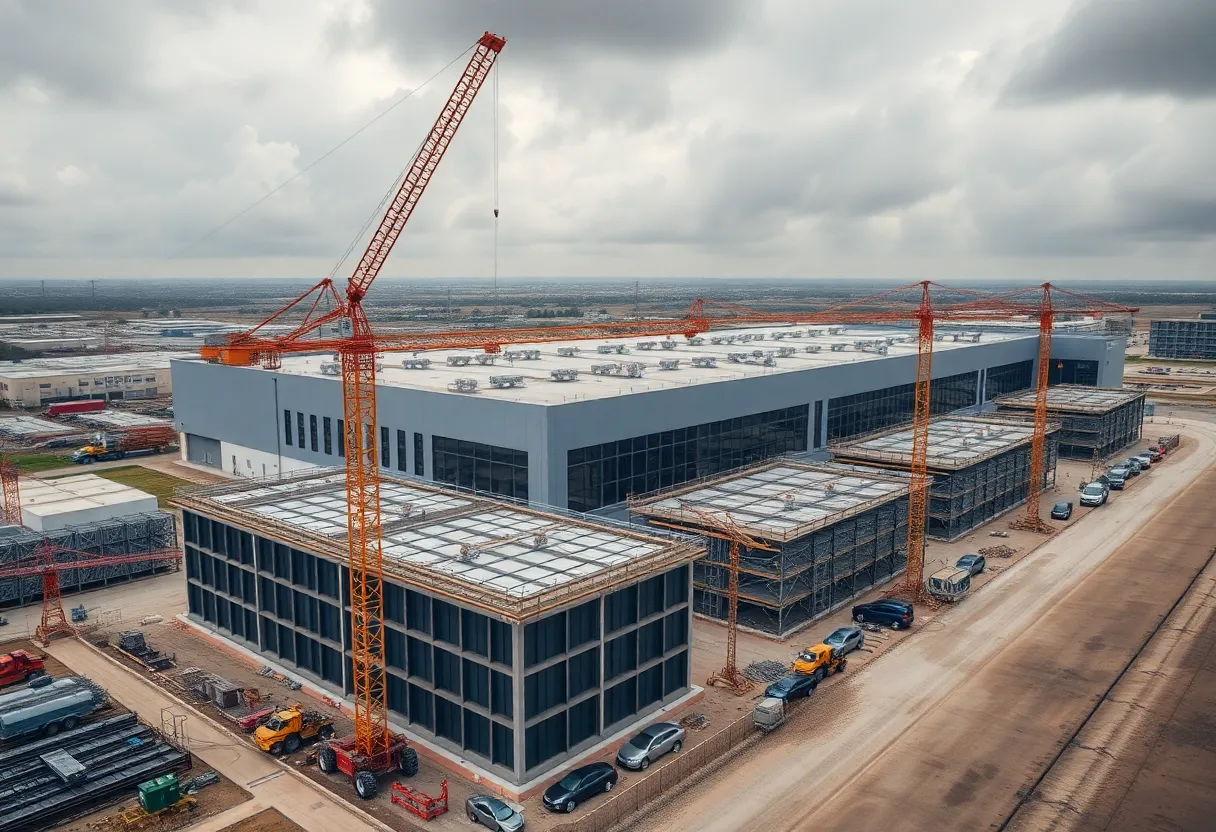

The construction site of Ford's electric vehicle battery plant in Marshall, Michigan.
Want to target the right audience? Sponsor our site and choose your specific industry to connect with a relevant audience.
Prominent brand mentions across targeted, industry-focused articles
High-visibility placements that speak directly to an engaged local audience
Guaranteed coverage that maximizes exposure and reinforces your brand presence
Interested in seeing what sponsored content looks like on our platform?
May’s Roofing & Contracting
Forwal Construction
NSC Clips
Real Internet Sales
Suited
Florida4Golf
Click the button below to sponsor our articles:
Sponsor Our ArticlesFord Motor Co.’s planned electric vehicle battery plant in Marshall, Michigan, is at risk due to proposed cuts to federal clean energy incentives. The plant is expected to create about 1,700 jobs, but concerns from Ford’s Executive Chair about the removal of tax credits threaten its viability. With revisions to the project’s scope and investment, Ford aims to make electric vehicles more accessible, while Michigan’s government pushes for an increase in EV registrations amidst the ongoing debate around federal incentives.
Marshall, Michigan – The future of Ford Motor Co.’s planned electric vehicle battery plant in Marshall is under threat due to proposed cuts to federal clean energy incentives by Congress. The plant, which is anticipated to create about 1,700 jobs, faces significant uncertainty as lawmakers contemplate eliminating tax credits that support battery production.
Concerns surrounding the plant’s viability were raised by Ford Executive Chair Bill Ford during the Mackinac Policy Conference on May 29. He emphasized that the project’s success is heavily dependent on retaining these incentives, warning that their removal could endanger the plant. Ford criticized the potential changes in policy, arguing that it is unjust to alter the rules after substantial investments have already been made in the development of the facility.
In addition to Ford’s remarks, it has been noted that President Biden’s climate legislation, designed to boost the electric vehicle (EV) supply chain and encourage consumer demand for EVs, is at risk. Proposed changes by Republican lawmakers would phase out the $7,500 consumer tax credit for electric vehicles by 2031 and eliminate manufacturing credits for battery makers. The new bill would also impose stringent restrictions on the use of Chinese materials and components, which could ultimately render the existing credits ineffective.
The Marshall battery plant was initially slated to produce batteries for up to 400,000 electric vehicles. However, this projection has since been reduced to approximately 230,000 EVs, primarily due to a decrease in consumer demand. Construction of the plant commenced in mid-2023, reaching significant milestones by December 2023, including completing the final steel beam. The facility will span about two million square feet across a 500-acre site and will consist of two main buildings.
Ford’s investment in the plant has also seen revisions, with the automaker lowering its planned expenditure from $3.5 billion to a range between $2.5 billion and $3 billion. This reduction underscores the pressures the company faces in balancing cost-efficiency with its ambition to provide affordable electric vehicles. Lowering battery costs is critical as Ford aims to make electric vehicles more accessible to the average consumer.
In light of the growing emphasis on electric vehicles, Michigan state police are testing the Ford Mustang Mach-E AWD as their inaugural electric vehicle, signifying a substantial shift toward modernizing law enforcement’s vehicle fleet in line with technological advancements.
Currently, Michigan has around 50,000 registered electric vehicles, a stark contrast to over 6.8 million gas and diesel vehicles. The state has set a goal to reach 2 million registered EVs by 2030 and state agencies are already incorporating electric vehicles to assist in achieving this target.
As the debate around federal incentives continues, the fate of Ford’s Marshall battery plant remains precarious, hinging on political decisions that could reshape the landscape for electric vehicle manufacturing in Michigan.
News Summary A federal jury has ruled that Purpose Point Harvesting, a Michigan farm labor…
News Summary In Michigan, a bipartisan coalition of lawmakers is advocating for a new package…
News Summary On June 11, Michigan House Republicans approved a $21.9 billion K-12 education budget…
News Summary Michigan lawmakers are advancing a "Tenant Empowerment Package" aimed at enhancing renters' rights.…
News Summary A JetBlue flight from Chicago O'Hare unexpectedly veered off the runway at Boston's…
News Summary California's Insurance Commissioner Ricardo Lara has initiated a formal investigation into State Farm's…